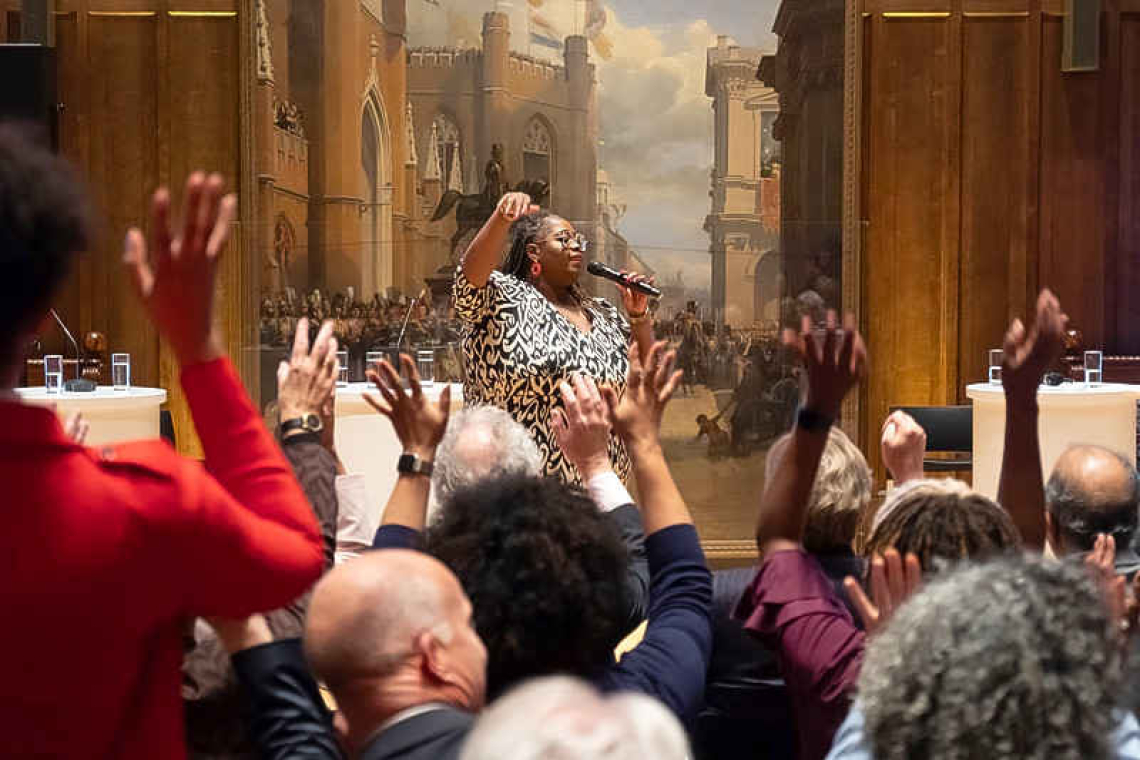Statia-born singer Shirma Rouse gave a powerful performance, bringing the celebration of 70 years of the Kingdom Charter to a heartfelt close.
THE HAGUE--“The Kingdom, that’s us – all of us. And all of us can contribute by fostering collaboration.” This was the message from Thom de Graaf, Vice President of the Council of State of the Kingdom, to a hall filled with leaders, policymakers, lawyers, doctors, scientists, and students from across the Kingdom last week.
The sentiment resonated strongly with the audience, as many shared stories revealing a painful lack of mutual understanding between the Kingdom’s countries and territories.
The Council of State celebrated the 70th anniversary of the Charter for the Kingdom of the Netherlands with a large gathering of invited guests. Curaçao was represented by Members of Parliament Quincy Girigorie (PAR), Zita Jesus-Leito (Independent), and Minister Plenipotentiary Carlson Manuel (MFK). Other notable attendees included the Chair of the Dutch Senate, the President of the Supreme Court, and Dutch Prime Minister Dick Schoof, who joined the event’s final session.
De Graaf highlighted a recent unsolicited advisory report from the Council of State, emphasising that the agreements within the Charter offer significant potential for improved cooperation if interpreted through a modern lens. The council recommended granting voting rights for the Dutch Parliament to residents of Curaçao, Aruba, and St. Maarten, and called for a dispute resolution mechanism to ease tensions, which frequently arise between the Kingdom’s countries.
State Secretary Zsolt Szabó of Kingdom Relations also addressed the advisory report, assuring attendees that government would respond to the council’s recommendations promptly. He reiterated the goal of ensuring that the Caribbean parts of the Kingdom become resilient and self-reliant, underpinned by good governance, sound financial management, and economic development.
Gilbert Isabella, former Representative for Caribbean Netherlands, remarked that strained relations between governments partly stem from the colonial past and a lack of understanding of each other’s cultures and circumstances. He also noted that the dismantling of the Netherlands Antilles in 2010 contributed to the ongoing tensions.
Curaçaoan State Council member Paul Comenencia reflected on the 2010 process, acknowledging that the Kingdom’s countries and islands may have rushed the dismantling. “Many issues were overlooked,” he said. Former GroenLinks MP Ineke van Gent, now Mayor of Schiermonnikoog, agreed, adding that politicians often avoided addressing concrete matters.
Former Minister Piet Hein Donner noted a widespread but incorrect assumption that the dismantling would solve all problems. “It’s an illusion to think 10-10-10 would change everything. Societal transformation doesn’t happen through legal decrees alone; they merely create the conditions for change,” said Donner, who also served as Vice President of the Council of State.
De Graaf stressed that genuine change is only possible through cooperation – between governments but, more importantly, among individuals and social organisations. “The Kingdom is not merely a political-legal entity. Above all, it is a connection between people on both sides of an ocean, linked by shared history, family ties, and cultures that continuously influence each other,” he said.
The youth panel members echoed this sentiment, with some sharing positive experiences of feeling at home across the Kingdom. Financial expert Paul David Romo from Bonaire adjusted easily to life in
the Netherlands, while Dutch student Lisa Posthuma felt at home in Curaçao despite not knowing anyone when she arrived.
However, not all stories were uplifting. Curaçaoan student Naomi Juliana shared her experiences with prejudice and discrimination during a hospital internship. Statia-born singer Shirma Rouse recounted being told to “go back to her own country” during her chemistry studies in the Netherlands.
When asked about her hopes for the Kingdom’s future in 2054, Rouse grew emotional. “I hope that by then, children won’t face what we still endure today. My wish is for children not to have to work twice as hard just to be accepted,” she said, referring to those with Afro-Caribbean heritage.
Rouse transformed her painful experiences into a powerful performance, bringing the event to a heartfelt close. Attendees – leaders, policymakers, lawyers, doctors, scientists, and students – ended the celebration of 70 years of the Charter by singing and dancing together, embodying the spirit of unity







